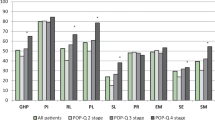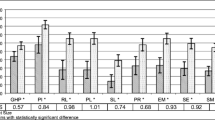Abstract
Introduction and hypothesis
The aim of this study is to validate the Portuguese translated version of the Prolapse Quality-of-Life Questionnaire (P-QoL).
Methods
Ninety-eight women completed the P-QoL questionnaire translated into Portuguese at baseline and on the second visit, 2 weeks later. Clinical data and Pelvic Organ Prolapse Quantification Index (POP-Q) according to the International Continence Society were obtained. Psychometric properties of the questionnaire were assessed.
Results
Sixty-eight symptomatic and 30 asymptomatic women for POP symptoms were studied. Most patients presented POP-Q > 2. The P-QoL demonstrated good psychometric properties. The test–retest reliability confirmed a highly significant stability between the total scores for each domain (P < 0.0001). The construct validation distinguished differences in P-QoL questionnaire scores between symptomatic and asymptomatic women.
Conclusion
The Portuguese version of the P-QoL questionnaire is a valid and reliable instrument to assess quality of life in Brazilian women with pelvic organ prolapse.
Similar content being viewed by others
Abbreviations
- GH:
-
General health
- ICS:
-
International Continence Society
- POP-Q:
-
Pelvic Organ Prolapse Quantification System
- POP:
-
Pelvic organ prolapse
- P-QoL:
-
Prolapse Quality-of-Life Questionnaire
References
Shah AD, Kohli N, Rajan SS, Hoyte L (2007) Racial characteristics of women undergoing surgery for pelvic organ prolapse in the United States. Am J Obstet Gynecol 197:70.e1–70.e8
Swift SE, Tate SB, Nicholas J (2003) Correlation of symptoms with degree of pelvic organ support in a general population of women: what is pelvic organ prolapse? Am J Obstet Gynecol 189:372–379
Digesu GA, Khullar V, Cardozo L, Robinson D, Salvatore S (2005) P-QOL: a validated questionnaire to assess the symptoms and quality of life of women with urogenital prolapse. Int Urogynecol J 16:176–181
Digesu GA, Santamato S, Khullar V, Santillo V, Digesu A, Cormio G et al (2003) Validation of an Italian version of prolapse quality of life questionnaire. Eur J Obstet Gynecol Reprod Biol 106(2):184–192
Cam C, Sakalli M, Ay P, Aran T, Cam M, Karateke A (2007) Validation of the prolapse quality of life questionnaire (P-QOL) in a Turkish population. Eur J Obstet Gynecol Reprod Biol 135:132–135
Lenz F, Stammer H, Brocker K, Rak M, Scherg H, Sohn C (2009) Validation of a German version of the P-QOL Questionnaire. Int Urogynecol J 20: 641–9
Guillemin F, Bombardier C, Beaton D (1993) Cross-cultural adaptation of health-related quality of life measures: literature review and proposed guidelines. J Clin Epidemiol 46:1417–1432
Bump RC, Mattiasson A, Bo K, Brubaker LP, DeLancey JO, Klarskov P et al (1996) The standardization of terminology of female pelvic organ prolapse and pelvic floor dysfunction. Am J Obstet Gynecol 175(1):10–17
Abrams P, Cardozo L, Fall M, Griffiths D, Rosier P, Ulmsten U et al (2002) Standardisation Sub-committee of the International Continence Society. The standardisation of terminology of lower urinary tract function: report from the Standardisation Sub-committee of the International Continence Society. Neurourol Urodyn 21(2):167–178
Hendriks EJM, Bernards ATM, Berghmans BCM, de Bie RA (2007) The psychometric properties of the PRAFAB-Questionnaire: a brief assessment questionnaire to evaluate severity of urinary incontinence in women. Neurourol Urodyn 26:998–1007
Nunnaly JC, Bernstein IH (1994) Psychometric theory. McGraw-Hill, New York
Tamanini JTN, Almeida FG, Girotti ME, Riccetto CLZ, Palma PCR, Rios LAS (2008) The Portuguese validation of the International Consultation on Incontinence Questionnaire-Vaginal Symptoms (ICIQ-VS) for Brazilian women with pelvic organ prolapse. Int Urogynecol J . doi:10.1007/s00192-008-0641-8
Donovan JL, Bosch R, Gotoh M, Jackson S, Naughton M, Radley S et al (2005) Symptom and quality of life assessment. In: Abrams P, Cardozo L, Khoury S, Wein A (eds) Incontinence. 3rd International Consultation on Incontinence, Monte Carlo. Health, Plymouth, pp 519–584
Fayyad AM, Redhead E, Awan N, Kyrgiou M, Prashar S, Hill SR (2008) Symptomatic and quality of life outcomes after site-specific fascial reattachment for pelvic organ prolapse repair. Int Urogynecol J 19(2):191–197
Sivaslioglu AA, Unlubilgin E, Dolen I (2008) A randomized comparison of polypropylene mesh surgery with site-specific surgery in the treatment of cystocoele. Int Urogynecol J 19(4):467–471
Srikrishna S, Robinson D, Cardozo L, Gonzalez J (2008) Is there a difference in patient and physician quality of life evaluation in pelvic organ prolapse? Int Urogynecol J 19(4):517–520
Human Development Reports [homepage on the Internet] (2009). United Nations Development Programme [updated 2008 Dec 18; cited 2009 Jan 17]. Available from http://hdrstats.undp.org/indicators/20.html.
Tamanini JTN, D’Ancona CAL, Botega NJ, Netto NR (2003) Validation of the Portuguese version of the King’s Health Questionnaire for urinary incontinent women. Rev Saúde Pública 37(2):203–211
Tamanini JTN, Dambros M, D’Ancona CAL, Palma PCR, Rodrigues Netto Jr N (2004) Validation of the “International Consultation on Incontinence Questionaire- Short Form” (ICIQ-SF) for Portuguese. Rev Saúde Pública 38:438–444
Acknowledgments
We thank the health professionals who composed the multidisciplinary committee review: Artur de Oliveira Rangel, Carlos Frederico Silveira, and Vera Maria Gomes Sena (gynecologists—Recife); Gustavo Borghesi and José Carlos Truzzi (female urologists—São Paulo); Márcia Salvador Geo (urogynecologist—Belo Horizonte); and Maria Alice Lelis and Regiane Glashan (nurses specialized in pelvic floor dysfunctions—Sao Paulo).
Conflicts of interest
None.
Author information
Authors and Affiliations
Corresponding author
Appendix
Appendix





Rights and permissions
About this article
Cite this article
de Oliveira, M.S., Tamanini, J.T.N. & de Aguiar Cavalcanti, G. Validation of the Prolapse Quality-of-Life Questionnaire (P-QoL) in Portuguese version in Brazilian women. Int Urogynecol J 20, 1191–1202 (2009). https://doi.org/10.1007/s00192-009-0934-6
Received:
Accepted:
Published:
Issue Date:
DOI: https://doi.org/10.1007/s00192-009-0934-6




